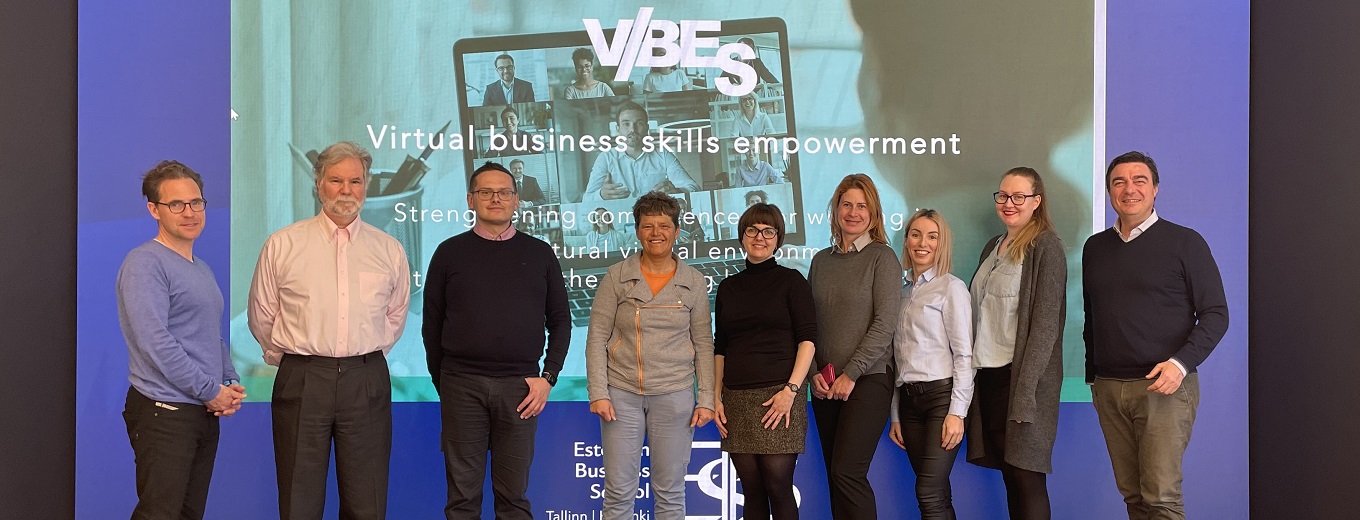The rapid digitalisation requires the right skills. The successful Erasmus+ project VIBES created training courses for effective virtual collaboration.
Working together virtually has become the new normal. The covid-19-related restrictions undoubtedly contributed to normalising digital ways of communicating and collaborating. This widespread use of digital means at work or in education comes with increasing needs for digital skills. This includes on the one hand knowledge of the different software programmes but, on the other hand, also competences on how to use them effectively for different tasks and purposes, especially when it comes to working in teams. This analysis was at the origin of the VIBES project. VIBES stands for ‘Virtual Business Skills Framework’ and is an Erasmus+ funded cooperation project involving educational institutions from different parts of Europe, including Switzerland.
The project consortium was built around a pre-existing student exchange partnership between a vocational college in Switzerland and a school in Estonia. The two exchange coordinators quickly realised in the pandemic that the exchanges had to continue but in a virtual format. In adapting the exchanges, the inevitable question on how to organise this in an effective manner and what skills learners and teaching staff needed for this online collaboration took centre stage. As many educational institutions were confronted with this same challenge, the coordinators decided not to address this issue alone but to find partners with the same questions. In the University of Dubrovnik, they found a partner willing to take on the lead coordination role. Soon thereafter, they found another partner in the LAB University of Applied Sciences from Finland and the University of Applied Sciences of the Grisons (FHGR) from Switzerland. The project consortium was completed with the two Estonian partners, Estonian Business School and the Smartwork Academy, the Belgian partner Institut de Haut Formation aux Politiques Communautaire (IHF) and the Higher School of Economics and Trade from Croatia. The University of Dubrovnik as lead coordinator submitted the project proposal under the special Erasmus+ call on Partnerships for Digital Education Resources Readiness in 2019, which was launched by the European Commission as a response to the pandemic. As Switzerland is not associated to the Erasmus+ programme, the inclusion of the Swiss partner in the project proposal was possible but had to be presented carefully. The added value that the Swiss partner would bring to the project had to be specifically explained. The second aspect of the Swiss situation was that the University of Applied Sciences of the Grisons FHGR could not take on the lead coordinator role, even though FHGR would have been well placed to do so. Ultimately, the project was successfully funded in 2020 and concluded in early 2023. As the Swiss partner could not receive funding from Erasmus+, FHGR was financially supported by the Swiss agency for exchange and mobility Movetia, under the Swiss Programme for Erasmus+ which enables the participation of Swiss institutions in such European collaboration projects.
VIBES had the goal to develop teaching and learning material for digital intercultural teamwork and entrepreneurial skills. The material targets students at vocational, secondary and higher education levels. These competences should improve the employability of the graduates, as digital competences and the ability to work effectively in teams are among the most sought-after competences by employers. In a broad analysis of the different digital training offers in the project countries, they found that most training courses are targeted at managers with the expectation that they would then pass the acquired knowledge on to their colleagues and subordinates. VIBES, in contrast, aimed to create bottom-up courses to impart virtual teamwork competences. VIBES’s approach is innovative as it offers a complete skills package for the efficient functioning of virtual teams. A particular feature of the digital transformation is that many roles and jobs are changing or even become obsolete more and more rapidly. VIBES addresses this challenge by not training people for existing roles but rather by giving them the entrepreneurial competences and the mindset of lifelong learning. The EU’s Entrepreneurial Competence Framework (EntreComp) served as the conceptual basis for VIBES.
The Erasmus+ project funding not only enabled the research and the creation of the training modules but also the exchange of hundreds of students and teaching staff to contribute to and test the modules in workshops and via the VIBES platform. FHGR project coordinator Professor Forster emphasised that the exchanges that were part of the project were key for the successful collaboration between the partners. On a strategic level, the project further provided a great opportunity for FHGR to build up internal competence on virtual teamwork as well as visibility for this topic and a strengthened profile of FHGR in this field. Professor Forster added that participating in the project also helped identify and engage with political stakeholders that are interested in the topic of digitalisation and entrepreneurship. Finally, FHGR could also benefit from the exchange of best practices within the consortium, for example how students are actively involved in study programmes in Finland.
Reflecting on the success factors of this Swiss-European collaboration project, Professor Forster pointed to the strong international partnership. Identifying and working with relevant and well-matched partners with complementary expertise is essential for a productive collaboration. He added that all the VIBES partners, including FHGR, invested much more in the project than required. The success of including a Swiss partner also had to do with the fact that they were highly engaged and treated as a de-facto full partner despite the non-association of Switzerland to Erasmus+, or in the words of the Croation lead coordinator on the role of the Swiss partner: “Overall, while being associated partner, their contribution could be regarded as the one of a full project partner.”
The successful conclusion of the project (the final report was evaluated as excellent) paved the way for a follow-up project VIBES 2, likely in the form of a summer school in the coming years.

